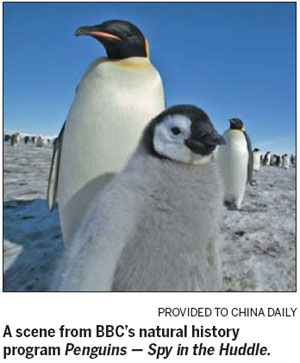CCTV buys 65 hours of nature television
Updated: 2013-08-28 07:59
By Liu Wei (China Daily)
|
||||||||
China's CCTV has struck a deal with BBC Worldwide, to buy the largest package of natural history programming that the State broadcaster has acquired this year.
CCTV has bought 65 hours of BBC programs, as announced at the third annual China Showcase of BBC Worldwide, held recently in Beijing. The price paid for the programs was not announced.
The deal involves factual programs, with natural history making up the bulk of the package.
Titles include Attenborough's Ark, featuring senior UK naturalist and broadcaster David Attenborough's exploration of 10 little-known endangered animals, and Penguins - Spy in the Huddle, which uses photographing equipment disguised as penguins to capture their vivid life.
But CCTV has not decided on the specific broadcasting time for the material.
"We have a long history with the BBC, and have collaborated with them for many years now," says Liu Wen, managing director, CCTV Documentary Channel.
"In the years that we have worked together, we have seen interest in documentaries increase among our Chinese viewers. BBC's factual programs are especially popular among Chinese audiences."
Pierre Cheung, VP and GM of BBC Worldwide, Greater China, agrees.
"This deal gives Chinese viewers even more access to award-winning quality natural history programming from the BBC's Natural History Unit, as well as access to top quality programs from other genres."
One of the most successful co-produced projects between the two broadcasters is Wild China, a six-part documentary that has been very well-received among China's documentary and wild animal lovers after being aired on CCTV in 2011.
According to Neil Nightingale, creative director of BBC Earth, one of BBC Worldwide's major brands launched in 2009 to market and distribute the BBC's natural history content outside UK, the film was an "intimate cooperation".

"Half of the production team were from CCTV," he says. "We have much experience in wild animal production, and CCTV has much production expertise in filming in China. They got us into some of the most remote areas in China at the right time."
It was the CCTV team who went to the reserves with giant panda researchers before the episode was made. With their recommendation the film successfully captured the courting and mating activity of giant pandas, the first time the complete process has been filmed in the wild.
The documentary won three awards at the Emmys in 2009 -Outstanding Achievement in a Craft: Cinematography in Nature Documentaries category, Outstanding Editing and Outstanding Music and Sound.
Following the success of Wild China, the two broadcasters are now working together on Hidden Kingdom, featuring the natural world's most fascinating diminutive characters from chipmunks in North America to giant rhinoceros beetles in Tokyo. In both 2-D and 3-D versions, the show looks at the challenges faced by the natural world's mini heroes.
The 3-D version of the documentary mainly targets giant screens in science centers and museums in China, says Nightingale, but in view of the popularity of documentaries in regular cinemas in many countries such as Germany and Japan, he is optimistic about its prospects in cinemas in China.
"The effect of being in the wild in 3-D on big screens can be very immersive," he says. "Now in China viewers may tend to watch feature films such as Avatar and Titanic 3-D on giant screens, but if we do inventive marketing, we will see them form the habit of watching documentaries in cinemas."
liuw@chinadaily.com.cn
(China Daily USA 08/28/2013 page8)

 Five apps to help you 'breathe' in Beijing
Five apps to help you 'breathe' in Beijing
 Wozniacki survives battle with Chinese qualifier
Wozniacki survives battle with Chinese qualifier
 Moscow air show opens with flight demonstrations
Moscow air show opens with flight demonstrations
 US preparing for probable strike on Syria
US preparing for probable strike on Syria
 Putting money on full moon
Putting money on full moon
 Language list aims to pass on Chinese culture
Language list aims to pass on Chinese culture
 Cancer patient delivers healthy baby
Cancer patient delivers healthy baby
 Chinese navy starts escort mission at Gulf of Aden
Chinese navy starts escort mission at Gulf of Aden
Most Viewed
Editor's Picks

|

|

|

|

|

|
Today's Top News
US envoy to visit DPRK to secure prisoner's release
US 'must consider impact' of winding down QE
China gearing up for plenary session
Japan suspends rocket launch at last minute
Global expertise a scarce asset for employers
Sino-Japanese meeting at G20 ruled out
New time limits for visa processing
Trending news across China
US Weekly

|

|







